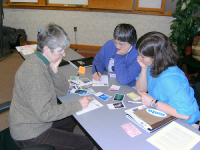Scientist-Educator Collaborative Workshop
Workshop Educators |
|
Held at the New England Center on the University of New Hampshire Campus
Friday, March 13, 2009 through Saturday, March 14, 2009 |
|
|
|
COSEE-OS is dedicated to fostering educator-scientist collaborations with a focus on investigating how inland audiences
can better understand how the oceans affect their everyday lives. Since 2006, over 100 educators from 18 states -- as far
away as Texas, Idaho and New Mexico -- have participated in professional development workshops at the
University of Maine, the University of New Hampshire, and the University of Connecticut. Some of our workshop attendees have
also been sponsored to participate in national conferences.
Based on experience from these and other COSEE-OS initiatives, we have crafted a new model of
Scientist-Educator Workshops to co-create online learning resources that align with National Science Education Standards,
Climate Literacy and Ocean Literacy Principles. Each workshop focuses on the current research topics of the internationally
known scientists who participate fully in all aspects of the workshop. Pedagogical techniques such as
concept mapping and on-line collaboration
tools are employed to foster sustained interactions between
the educators and scientists.
In this workshop, 12 educators were matched with 5 ocean and climate scientists from the University of New
Hampshire to improve their collective understanding of Earth's major ocean - climate systems. Click on their
names in the menu at left to learn more about these educators and how some of them are applying what they've learned
in their classrooms.
|
|
|
Watch a video
of educator Julianne Mueller-Northcott brainstorm ways that she could use COSEE tools in her own classroom. |
|
Quotes from Workshop Participants
"The scientist-educator interactions were a breath of fresh air for me as an educator. We get so bogged down in grading and behavior that the opportunity to hear new ideas and find out what researchers are doing in an informal setting gives us new enthusiasm for the field of biology."
"I have confidence I will be able to add concept maps to my Chemistry courses and help my students understand more difficult concepts."
|







